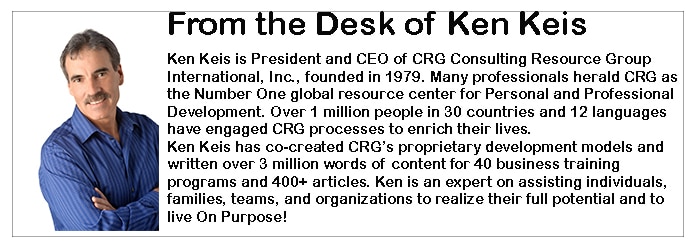Be True to Yourself
The Customer is not always right!
Guest Post by Ken Keis of
Opinion: A view, judgment, or appraisal formed in the mind about a particular matter; belief stronger than impression and less strong than positive knowledge; a formal expression of judgment.
Yes, there are times when our clients have concerns to which we need to respond, such as the package arrived damaged or later than we promised. In workshops during the height of the customer-service trend in the early ’90s, I actually taught that the customer is always right—but no longer.
Who has your ear? Who is providing you with feedback?
Several years ago during one of our Assessment Systems Certification Workshops, an individual shared that he did not like CRG’s leveraged affiliate business model. He was so upset that CRG would pay him a fee for his referrals, he asked for his money back on the session. He thought it was unprofessional to honor others with a referral fee.
Note: He was the only person to ask for a refund in over 10 years. His business has always struggled. He means well but he is not respected in the business community as competent businessperson. This is not a statement of judgment but, if I am going to seek counsel, it would be from individuals far wiser, more successful, and more experienced than I am.
Should I change CRG’s business model because of one contrary opinion among hundreds of positive ones? Of course not, but sadly, many people would.
Here’s another example.
One of my colleagues, a member of the National Speakers Association, had just completed a keynote address—1 of about 50 a year for which he is paid a significant sum—when an audience member approached him and started in on how she could help him with his speaking style. If I wanted your opinion, I would have asked for it!
Is it possible that the speaker does not want to change his style? After all, his style is why the decision-maker paid him a significant amount to speak.
And why did that total stranger think it was appropriate to share her thoughts without asking permission?
It appears that almost everyone has an opinion, but few are qualified to provide one.
Have you changed your business model (or direction of your life) because of other people’s opinions?
What would your life or business look like if you changed it to fit everyone’s (in many cases, unsolicited) opinion? You certainly would not be living your purpose.
That is why the customer is not always right. People have issues and we want to do right by them, but we can’t own their stuff. The research shows that no matter how gifted a presenter you are, about 5% of any audience is not going to like you. Yes, we want everyone to like us, but that’s not going to happen.
About 15 years ago, I stopped using participant evaluation forms with a numeric 1-to-10 measuring format or any mention of the lunch and the facility. I found a high percentage of the group was more interested in complaining about the lunch than addressing the workshop content. The session was about sales, leadership, living on purpose, and so on. The lunch had nothing to do with behavioral transformation!
In one workshop, I got both these comments.
Best presentation on Sales that I’ve attended in my 20 years in this industry
Worst presentation I have ever attended
Whose opinion matters? Neither! In the end, you must feel comfortable in your own skin. That’s why Self-Worth is so important to our success. If we constantly change because of others’ opinions, we stand for nothing.
The “customer is not always right” mindset applies to all areas of our lives.
My point is this: No matter who you are or what you do, unsolicited opinions and comments will be offered. Many will have no merit and should be completely ignored. That includes “well-meaning” family members and friends who are judging the way you “should” run your life or business.
Unless the advisor has a track record of success in the exact area you need, why would you listen?
Here are some examples.
Someone who has no children tells you how to parent.
An individual who has had no success in investing tells you how to invest your money.
A career counselor who dislikes his or her job is counseling you on how to live your life on purpose.
A person who has never been successful in business tells you how you should run your company.
An average or below-average sales rep tells the sales superstar how to improve his/her sales performance.
A marketing specialist who is struggling for business themselves wants you to hire them.
An individual who has never supervised others tells you how to lead a team.
The list goes on…
In the end, you must live your own life and run your own business. Don’t let dysfunctional clients, individuals or uninformed family and friends inject their opinions into your space. Be respectful, but simply say No.
That’s why I stopped seminar evaluations altogether. The only feedback I need is from the decision-maker who invested in my session.
Unless you are one of my trusted advisors, I am not interested in your opinion about my presentations. After 23 years and 2500 presentations, I know myself. I have my own personal style and I am not going to change—nor should you—just because a minority did not like something.
Of course, there are some exceptions, such as feedback from individuals in authority at work and those you trust the most. Even then, make sure you are not being forced to be someone you are not—or expected to compromise your values in favor of another person.
I encourage everyone to stand in your personal and professional space with confidence. You can choose to seek wisdom from others but you must be watchful of the qualifications of your sources.
When you are confident and clear about who and what you are, others’ opinions will no longer impact you. You don’t need validation because you are secure in yourself. And negative feedback will not take you out.
Review the action steps to confirm possible items where you can improve and not let others drive your agenda in life.
Action Steps
Your Customer is NOT Always Right!
- Are you completely clear about what is important to you, in all areas of your life? If not, what do you need to confirm?
- Have you allowed unsolicited opinions from customers or unqualified individuals to influence your life and business? If Yes, why have you allowed that to happen?
- What has listening to others’ ill-considered opinions cost you in terms of direction, confidence, and success?
- Decide this moment that you will not allow ignorant opinions into your personal or professional space. What do you need to change or shift to achieve that objective?
- The reality is that if you stand for anything, someone will disagree. If you never have anyone disagree with you, are you living authentically or are you simply trying to please others?
- Feedback is an important part of growth; proactively select your group of advisors to make sure they have a proven track record of success in the area where you seek counsel. Make sure those individuals will tell you the truth—not just what you want to hear.
- Set an objective that you will take the necessary steps to mature to a level where the opinions of others do not matter.
To Know Thyself and keep Strong in face of others opinions
- To clairify your values and style, complete the CRG’s Values Preference Indicator (VPI) and
- the Personal Style Indicator (PSI) to get to know yourself better so you are less influenced by others.
- To understand how your level of self-worth is affecting your success, complete theSelf-Worth Inventory.
- To help you understand your tendencies and what is important to you, read Why Aren’t You More Like Me?“!
Your life or business is your own to live.
Until next time, keep Living On Purpose.

Ken Keis
For information on CRG Resources, please visit http://www.crgleader.com/home.
Interested in Ken Keis speaking at your event?




